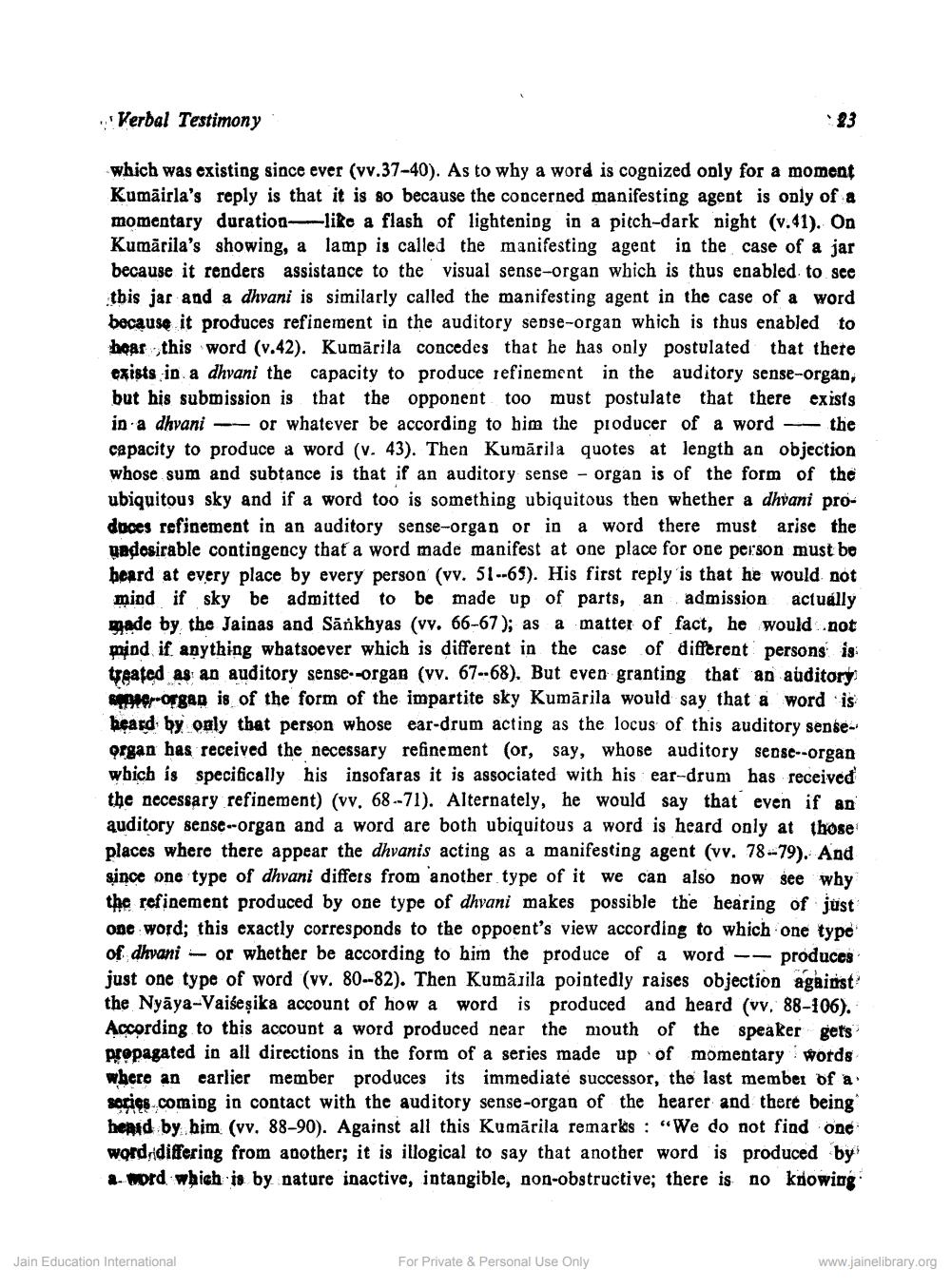________________
Verbal Testimony
which was existing since ever (vv.37-40). As to why a word is cognized only for a moment Kumāirla's reply is that it is so because the concerned manifesting agent is only of a momentary duratioa---like a flash of lightening in a pitch-dark night (v.41). On Kumärila's showing, a lamp is called the manifesting agent in the case of a jar because it renders assistance to the visual sense-organ which is thus enabled to see tbis jar and a dhyani is similarly called the manifesting agent in the case of a word because it produces refinement in the auditory sepse-organ which is thus enabled to hear this word (v.42). Kumārila concedes that he has only postulated that there exists in a dhvani the capacity to produce refinement in the auditory sense-organ, but his submission is that the opponent too must postulate that there exists in a dhvani --- or whatever be according to him the producer of a word - the capacity to produce a word (v. 43). Then Kumārila quotes at length an objection whose sum and subtance is that if an auditory sense - organ is of the form of the ubiquitous sky and if a word too is something ubiquitous then whether a dhvani prodoces refinement in an auditory sense-organ or in a word there must arise the gadosirable contingency that a word made manifest at one place for one person must be beard at every place by every person (vv. 51--65). His first reply is that he would not mind if sky be admitted to be made up of parts, an admission actually made by the Jainas and Sānkhyas (vv. 66-67); as a matter of fact, he would not mind if anything whatsoever which is different in the case of different persons is teated as an auditory sense--organ (vv. 67-68). But even granting that an auditory
per-organ is of the form of the impartite sky Kumārila would say that a word is heard by only that person whose ear-drum acting as the locus of this auditory senseorgan has received the necessary refinement (or, say, whose auditory sense--organ wbich is specifically his insofaras it is associated with his ear-drum has received the necessary refinement) (vv. 68-71). Alternately, he would say that even if an auditory sense--organ and a word are both ubiquitous a word is heard only at those places where there appear the dhvanis acting as a manifesting agent (vv. 78-79). And since one type of dhvani differs from another type of it we can also now see why the refinement produced by one type of dhvani makes possible the hearing of just one word; this exactly corresponds to the oppoent's view according to which one type of dhvani - or whether be according to him the produce of a word -- produces just one type of word (vv. 80--82). Then Kumājila pointedly raises objection against the Nyāya-Vaiseșika account of how a word is produced and heard (vv. 88-106). According to this account a word produced near the mouth of the speaker gets propagated in all directions in the form of a series made up of momentary words where an earlier member produces its immediate successor, the last member of a sories.coming in contact with the auditory sense-organ of the hearer and there being heard by him (vv. 88-90). Against all this Kumārila remarks: “We do not find one word differing from another; it is illogical to say that another word is produced by 2-word which is by nature inactive, intangible, non-obstructive; there is no knowing
Jain Education International
For Private & Personal Use Only
www.jainelibrary.org




